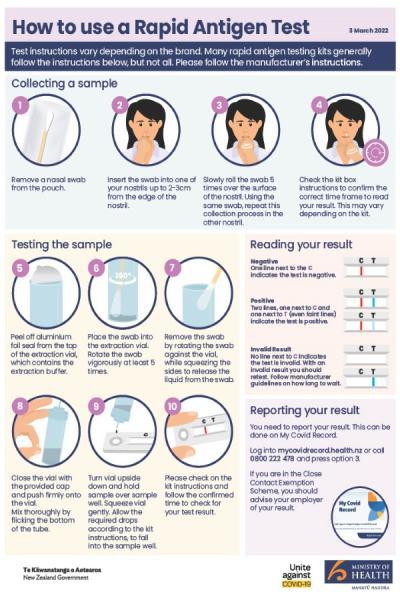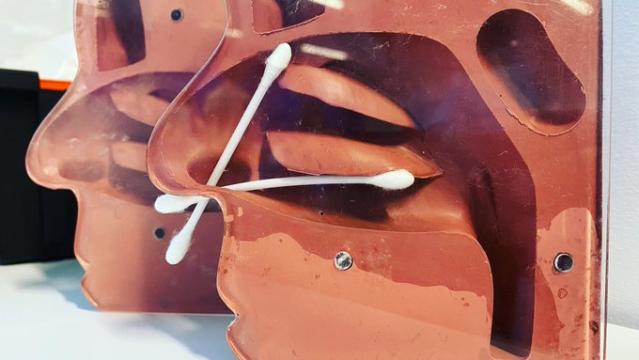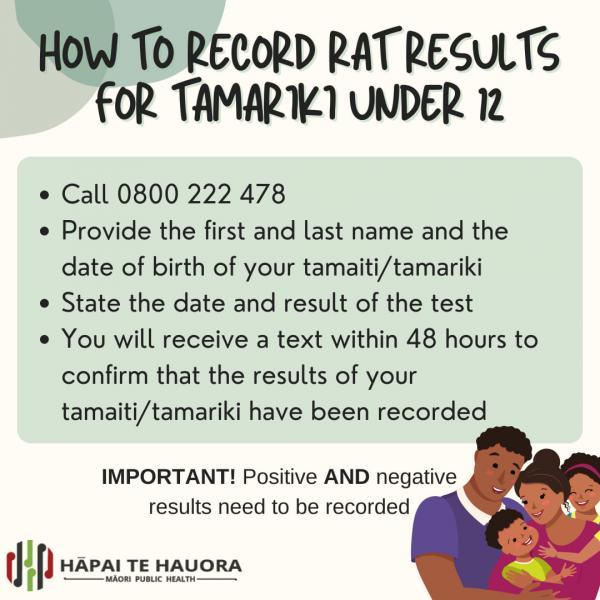What is a rapid antigen test (RAT)
A rapid antigen test is a test which checks if someone has COVID-19.
Results are available in about 20 minutes and sometimes sooner.
How to get your child tested for COVID-19
Use a RAT test if your child has COVID-19 symptoms, or any cold or flu symptoms. The most common symptoms are a cough, sneezing, runny nose and a fever.
Where can my child get a rapid antigen test?
Free rapid antigen tests (RATs) are widely available. Anyone can get free RATs. You do not need COVID-19 symptoms to order RATs.
Free packs of RATs for you and your whānau are available from a range of locations, including testing sites, marae and pharmacies.
Find a community testing site.
Read more information about how to get a COVID test at the Unite Against COVID-19 website
How do I use a rapid antigen test?
A rapid antigen test usually uses a front of the nose swab which detects specific proteins from the COVID-19 virus.
There are different tests available, so make sure you follow the manufacturer's instructions.
Guidance on using a rapid antigen test
See how to use a RAT at the Unite Against COVID-19 website.

Learn how to do a rapid antigen test by watching this video of Dr Rachelle Love and Ruby, courtesy of Hāpai Te Hauora and Counties Manukau District Health Board.
You can also learn how to do a rapid antigen test on a child by watching the video of a surgeon doing one on his daughter at the top of this page.
The ear, nose and throat surgeon also posted this image with the following comment: "The nose goes back, not up. Aim for the back, not for the brain. Take care, friends".
The nose goes back - not up. Go low and aim for the back - that's the lower swab in the photo below.

Keep all rapid antigen tests in a place young children can't reach. Store them according to the manufacturer's instructions.
What do I do after my child has tested for COVID-19?
Report the test result whether your child has tested positive or negative for COVID-19.
You can do this online through My Covid Record or by calling the COVID-19 helpline on 0800 222 478 (choose option 3).
If your child is under 12 you have to report the results over the phone.
Read more about reporting COVID-19 test results.

Learn more about caring for a child with COVID-19
Are there other tests my child can do?
PCR tests are still being used in some situations. But rapid antigen tests are the main test being used.
Testing negative but feeling positive?
You can read a quick guide to why some people who return a negative rapid antigen test result may still be infected - and infectious. The guide is written and illustrated by Siouxsie Wiles and Toby Morris and is on the Spinoff website.
Check why some positive people return negative results
More KidsHealth content on COVID-19
See KidsHealth's section on COVID-19
See all KidsHealth's content on COVID-19 immunisation in children
